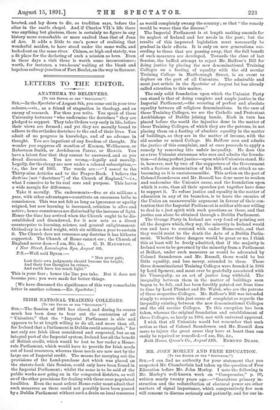LETTERS TO THE EDITOR.
ANATHEMA TO BELIEVERS.
[To THE EDITOR OF THE "SPECTATOR."] the Spectator of August 8th, you come out in your true colours,—viz., as a friend of stagnation in theology, and an enemy of research. For thus you write. You speak of those University lecturers "who undermine the doctrines" they are pledged to support. They take Orders very early in life, before their views are formed ; and yet they are morally bound to adhere to the orthodox doctrines to the end of their lives. You admit of no progress in knowledge, and of no advance in thought. You are impatient of any freedom of thought. No wonder you suppress all mention of Kuenen, Wellhausen, or Robertson Smith, or Archdeacon Farrar, or Haweis. You have a latent fear that they cannot be answered, and so you -dread discussion. You are wrong,—legally and morally. Legally, for the clergy are now under a relaxed subscription,- i.e., the law of 1865. The words are :—" I assent to the Thirty-nine Articles and to the Prayer-Book. I believe the doctrine [not "doctrines"] of the Church of England,"—i.e., what I conceive to be its real core and purpose. This leaves a wide margin for difference.
Take it morally. The endowments—five or six millions a year, with other advantages—constitute an enormous bribe to oonsciences. This was not felt as long as ignorance or apathy reigned, but now learning is increased, criticism is alive and active ; hence consciences are disturbed by the increase of light. Hence the time has arrived when the Church ought to be dis- established and disendowed, for it now acts as a direct counterpoise to learning, science, and general enlightenment. -Orthodoxy is a dead weight, with six millions a year to sustain it. The Church dare not renounce any doctrine it has hitherto supported. The Church of Rome cannot err ; the Church of
P.8.—Well said Byron :— " Men grow pale, Lest their own judgments should become too bright, And their free thoughts be crimes, And earth have too mach light."
This is your fear ; hence the-line you take. But it does not become you ; you were made for better things.
[We have discussed the significance of this very remarkable letter in another column.—En. Spectator.]


































 Previous page
Previous page